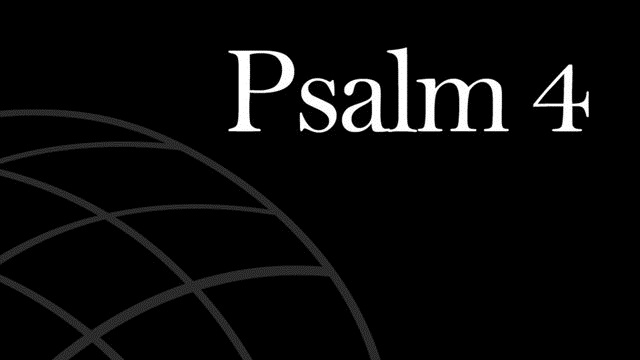Read Psalm 4
 If Psalm 3 is a morning prayer, Psalm 4 can be read as an evening prayer. Further, just as Psalm 3 provides some insight into David the leader, so Psalm 4 does likewise, if Davidic authorship is accepted. In some sense, then, these two psalms may be read together, and perhaps, have been brought together in the Psalter for this reason.
If Psalm 3 is a morning prayer, Psalm 4 can be read as an evening prayer. Further, just as Psalm 3 provides some insight into David the leader, so Psalm 4 does likewise, if Davidic authorship is accepted. In some sense, then, these two psalms may be read together, and perhaps, have been brought together in the Psalter for this reason.
The first verse opens the psalm with a passion-filled fourfold petition. Most English versions render the second phrase as “You have given me relief.” There is some scholarly debate about the correct interpretation of the Hebrew verb here, and Craigie translates the phrase as, “When I am in distress, give me room.” This seems to fit the verse better than the English translations which place a confession of relief in the midst of two desperate pleas. In Craigie’s translation, the whole verse is one sustained cry to God for help. In fact, it is stronger than that; the psalmist is telling God what to do: Answer me! Give me room! Be gracious to me! Hear my prayer!
What has happened to arouse this desperate cry to God? Some indication of David’s circumstances is found in verses 2 and 6a: David’s reputation is under assault, his leadership is questioned, his honour has been turned into shame. Although we do not know exactly what has occasioned this reversal of his fortunes leading to humiliation, some scholars suggest that the nation is facing difficulties and David is being blamed. Lies, vain words and empty rumours circulate. Indeed many are saying, “Who will show us some good?” Perhaps God’s goodness has departed and they want to see the leader replaced. Politics has not changed much over the millennia!
In the face of this trouble and false accusation David protests his innocence: “Answer me when I call, O God of my right.” He reminds himself—and his accusers—of the Lord’s protection. Verse 3 is beautiful: “But know that the Lord has set apart the godly for himself; the Lord hears when I call to him.” David’s confidence is not grounded in himself, his strategic ability, his military prowess, or anything else belonging to him. His confidence is confidence in God, confidence grounded in God’s call and God’s faithfulness. The God who called and anointed him will also sustain and keep him.
Verses 2-5 are unusual, as though addressed to his opponents, even as they are being spoken to God in the midst of his prayer. Perhaps David is “processing” his stress in prayer to God. Perhaps he is formulating his response to his accusers in this environment of prayer. In any case he counsels his opponents:
- Stop listening to lies and empty words;
- If you are angry – do not sin! Search your own heart, keep quiet. The moment your anger leaks out in words or actions you sin against the innocent;
- Rather, offer right sacrifices to God and return to your trust in God;
- Remember: the Lord sets apart the godly for himself, and listens to me when I call to him.
In 6b David returns to petition, echoing the words of the priestly blessing in Numbers 6:26: “Let the light of your face shine upon us, O Lord!” (Compare also verse 1: “Be gracious to me!”) David is still telling God what to do! Craigie sees the petition continuing in verse 7 which he translates as “Put more joy in my heart…” It is worth noting that David is not praying for the destruction of these enemies, or for his own vindication. He prays rather that the light of God’s presence might shine upon all, and that his heart would be filled with joy. In so doing he comes to a place of peace and, trusting in God’s protection, is able to lie down to sleep (verse 8).
*****
Being the object of blame is difficult enough when we are in fact blameworthy; suffering blame and false accusation when we are in fact innocent of the charges is hurtful, stressful and demoralising. Faced with such distressing circumstances, the psalmist prays through to a place of peace.
Prays through. Now that is the language of old-timers in the faith! It refers to the persistence in prayer that holds fast to the biblical promises, which wrestles with all the fears, anxieties and doubts that are faced, until one-by-one they are brought under the reign of God’s peace. In this psalm David’s prayer is both urgent and bold. Whence cometh this kind of boldness in prayer that dares to tell God what to do? What is the difference between this boldness in prayer and an unholy arrogance that presumes to tell God what to do?
David’s boldness is born of a long association with God in prayer, devotion and worship, and apart from this association could be nothing but presumption. There is a knowledge of God which comes through study; there is also a knowledge of God which grows through association, fellowship, obedience, and interaction. David knew the Lord, trusted God, relied on his promise in Scripture, claimed it and prayed it, and rested in the faithfulness of the God who had called, chosen and set him apart. Sure that he was in the Lord’s safe-keeping, he laid down in peace and slept. The prayer has not—yet!—made any discernible difference to his circumstances—in the morning all the enemies will still be there. But having brought his concerns and processed his stress in prayer, David goes to sleep a peaceful man.